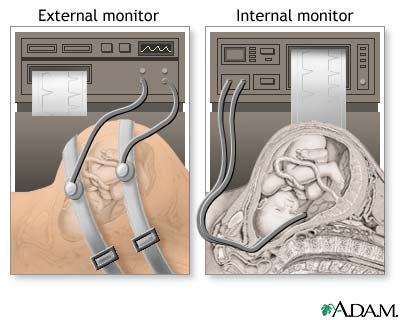


 |  |  |
| | ||
Epidural - series: Procedure, part 5
 |
|
Epidurals are very effective at relieving labor pain, but they have some drawbacks: First, they take up to 20 minutes to administer and take effect. Epidurals can slow labor if they're given too soon, and being numb from the waist down may make it harder for you to push your baby out. Unless you are given a "walking epidural" or "narcotic spinal", you'll need to stay in bed for your entire labor. Epidurals can also cause your blood pressure to drop, which in turn may slow your baby's heartbeat. To prevent this, you'll be given intravenous fluids and may be asked to lay on your side to help your blood circulate. To be on the safe side, your doctor will keep close tabs on your baby by continuously monitoring your blood pressure and his heart rate.
Update Date: 5/2/2008 Updated by: Linda Vorvick, MD, Seattle Site Coordinator, Lecturer, Pathophysiology, MEDEX Northwest Division of Physician Assistant Studies, University of Washington School of Medicine; and Susan Storck, MD, FACOG, Clinical Teaching Faculty, Department of Obstetrics and Gynecology, University of Washington School of Medicine; Chief, Eastside Department of Obstetrics and Gynecology, Group Health Cooperative of Puget Sound, Redmond, Washington. Also reviewed by David Zieve, MD, MHA, Medical Director, A.D.A.M., Inc.
